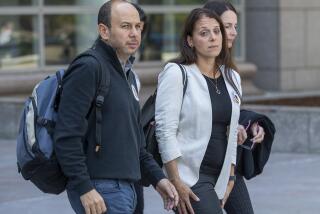Statements in McMartin Case Called Inconsistent
- Share via
A defense attorney in the McMartin Pre-School molestation case said Tuesday he is “suffering embarrassment” at the “inconsistencies” in statements made by former prosecutor Glenn Stevens, whose allegations are the basis of an attempt to have charges against two remaining defendants thrown out.
Daniel Davis, who represents Ray Buckey, said, “I’ve seen a difference in his statements,” depending on whether they were made in taped conversations for a movie project, meetings with defense attorneys, interviews with reporters or on the witness stand at a continuing pretrial hearing.
“They are inconsistent both in degree and content,” Davis, who called Stevens as a defense witness, said outside the courtroom. Stevens has been granted immunity for his testimony.
“The only thing I think is solid is that he has admitted to intentionally withholding material evidence,” Davis said. He was referring to Stevens’ failure to relay information that the late Judy Johnson, the mother whose complaints triggered the investigation, had telephoned him several times with bizarre allegations suggesting that she might be crazy.
The main issue in the hearing has been whether the prosecution in the 3-year-old case has withheld information from the defense.
In a declaration accompanying his dismissal motion, Davis described a meeting with Stevens last September in which the former deputy district attorney told him that chief prosecutor Lael Rubin and several investigators were aware of notes made by Johnson before the case was filed. Prosecutors never gave those notes to the defense, for reasons that are unclear.
“Mr. Stevens explained that he had personal knowledge these individuals were aware of the handwritten notes, because he spoke with them about their contents and implications; and at various times he saw each of them holding either the originals or photocopies of the Judy J. notes,” Davis wrote in the declaration.
Johnson’s notes are a stream-of-consciousness description of children being tortured, church rituals involving human sacrifice and antics that included witches, coffins and a lion and elephant.
However, Stevens testified that he never told Davis he had seen such a document in Rubin’s hands. He said that it was contained in a packet given to him when he joined the prosecution, and that he had assumed that it had already been relayed to the defense.
In fact, he testified, he is not aware that Rubin or anyone else in the district attorney’s office ever intentionally withheld evidence to which the defense was entitled.
Rubin has already testified that she delayed telling the defense about one allegation. And Deputy Dist. Atty. Christine Johnston testified that both prosecutors sat on information that she urged them to turn over.
Stevens said he did not report the strange phone calls from Johnson because she had already testified at the preliminary hearing and because he thought the trauma of learning that her child had been molested had caused her to “flip out.”
After two days of legal wrangling, prosecutors finally were permitted Tuesday to play an excerpt of a taped diary recorded by Stevens in the fall of 1984 that they said would cast doubt on his credibility as a witness.
It was something of an anticlimax to Friday’s courtroom drama, when prosecutors suddenly produced a tape that Stevens had testified he had lost. The excerpt contained Stevens dictating a simple definition of the legal term “ hearsay rule “ to himself.
Prosecutors say an attorney who was taping his thoughts for his own use would not have needed to include such a definition, and the fact that he did so indicates that he was already planning a book or movie in the early stages of the case. He has testified that he did not decide on such a venture until many months later.
Buckey and his mother, Peggy McMartin Buckey, are accused of abusing 14 children at the McMartin Pre-School in Manhattan Beach. Their trial is set to begin after the evidence hearing.
More to Read
Sign up for Essential California
The most important California stories and recommendations in your inbox every morning.
You may occasionally receive promotional content from the Los Angeles Times.













